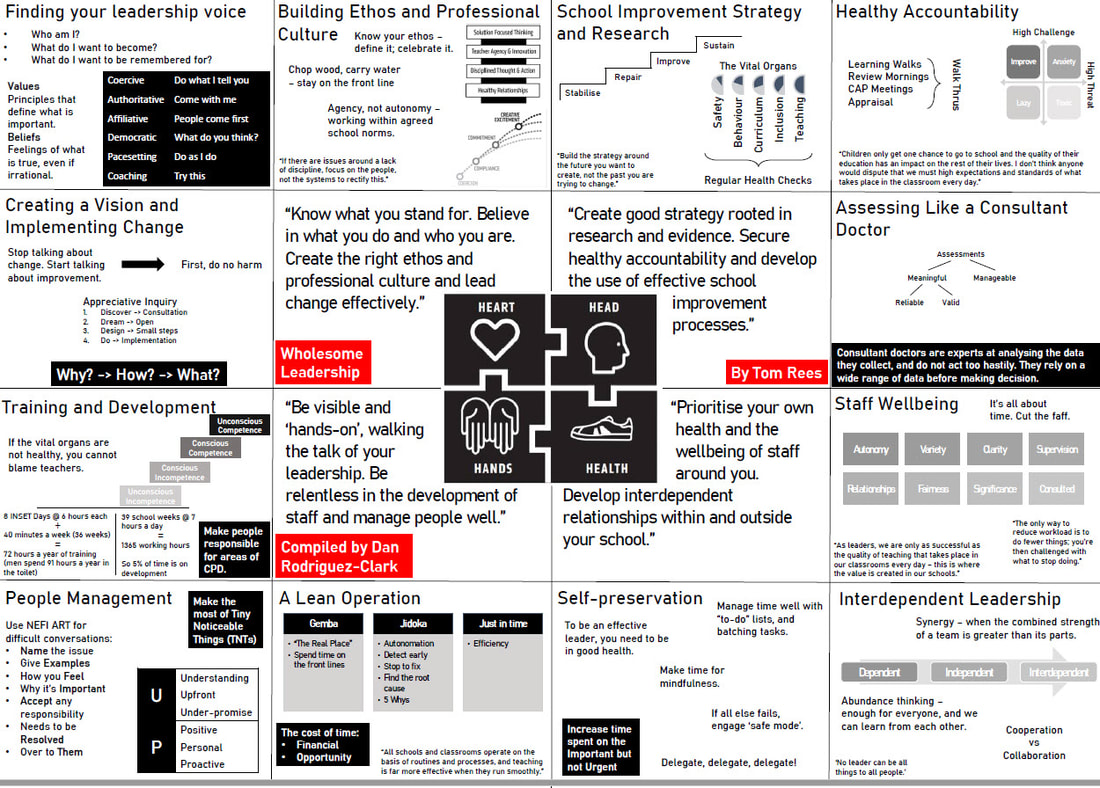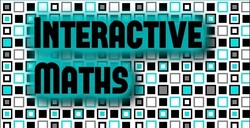| "People can't live with change if there's not a changeless core inside them. The key to the ability to change is a changeless sense of who you are, what you are about and what you value" |
| "Leaders make the weather." |
Ethos - What we're here for.
Culture - The way we do things.
Creating a professional culture requires:
- Healthy relationships
- Trust - do what you say you will; don't talk behind people's backs
- Over-communication - make sure the message is heard by everybody
- Acceptance - that we are all different and bring our own strengths
- Managing conflict - don't try to win arguments (you never truly win), and explore differences of opinions
- Disciplined thought and action
- Enacting school policies - are all staff being consistent and disciplined about this?
- Avoid Bureaucracy - if all staff are disciplined there is no need for excessive accountability
- Teacher Agency and Innovation
- Agency - teachers having ownership over their development
- Agency, not autonomy - don't let staff stop doing what makes them great, or out of a set of agreed structures
- Innovation - not a licence to try anything that hasn't been thought through carefully, but value new ideas
- Solution-focused thinking
- Default positive - adopt a mindset of finding the positives in situations, rather than the focusing on the problem
- Coaching - use coaching style conversations to flip conversations
- Chop wood, carry water
- Stay connected - to the very core of what a school does, by doing small tasks that keep you in the loop
| "Great things are done by a series of small things brought together." |
For implementing change:
- Beware the visionary
- First, do no harm
- Apply appreciative inquiry
- Consultation
- Avoid compromise
- Take small steps of change
- Manage change well
| "Thinking is the hardest work there is, which is probably why so few people engage in it." |
- Stabilise - Identifying the reality
- Repair - Taking control
- Improve - Embedding strategies
- Sustain - Ensure lasting success
The vital organs model of school improvement follows the idea that cosmetic surgery will not fix major problems. Just like the vital organs of the body, if one of them is failing, you have to treat the problem first. It is important to do regular health checks of the vital organs to see how they are doing.
- Safety - if students (and staff) are not physically and psychologically safe, then nothing else matters
- Behaviour - behaviour can hijack learning in the classroom, and must be a continual focus
- Curriculum- a broad, balanced and rigourous curriculum ensures students are learning stuff that is worthwhile
- Inclusion - everybody needs access to the curriculum, but the most at risk are often the ones who lose out if behaviour and curriculum are not in place first
- Teaching - teaching is a vital organ, but without the others working healthily it will not be as effective as it can be.
| "God grant me the serenity to accept the things I cannot change; courage to change the things I can; and wisdom to know the difference." |
The most important way to manage accountability - get in classrooms!
Use effective processes such as learning walk, appraisals, with preparation and feedback, but do them well:
- First, do no harm
- Plan and communicate well
- Execute well
- Do 'with' not 'to'
- Avoid judging
- Give good feedback
- Follow up and follow through
- Keep workload lean
- Evaluate properly
- Repeat
| "When a measure becomes a target, it ceases to be a good measure." |
Validity - measure of accuracy. Does the assessment tell us what we want it to? Is the language element too high in a maths paper so the problems in English not Maths?
Steps to effective (summative) assessment
- Choose what to assess and why
- Decide when to assess
- Beware the rubrics
- Use tests well
- Avoid the ghosts of levels
- Read the data well
- Respond to assessment
- Communicate to parents
- Make it manageable
- Repeat and tinker with care
| "Every teacher needs to improve, not because they are not good enough, but because they can be even better." |
It is important to have different development models in place for staff at different stages of their careers. Given the short amount of time dedicated to developing teachers, we have to make sure it is used optimally.
The Standards for Professional Development
- Professional development should have a focus on improving and evaluating pupil outcomes
- Professional development should be underpinned by robust evidence and expertise
- Professional development should include collaboration and expert challenge
- Professional development programmes should be sustained over time
- Professional development should be prioritised by school leadership
Beware the fact that teachers will often fall in the unconcsiously incompetent category, unaware that they don't know something, but also falling for the Dunning-Kruger effect and thinking they do it already. Coaching has a role to play here. Give kind, specific and useful feedback.
| "I've learned that people will forget what you said, people will forget what you did, but people will never forget how you made them feel." |
To plan a difficult conversation use NEFI ART:
- Name the issue
- Give an example
- Say how it makes you feel
- Explain why it's important
- Accept what you might have done to contribute to the problem
- Make it clear this needs to be resolved
- Over to them - what do they think?
When managing people keep in mind:
- The little things - TNTs go a long way to buy you credibility for when you need it
- Clarity is everything - stop things from going wrong in the first place
- Do fewer things
- Make fewer changes
- Communicate better
- Improve induction
- Pulling rank and cutting slack - have the awkward conversations when necessary, but remember teachers are human with lives outside school
- Act in haste, repent at leisure - think and plan carefully before having a difficult conversation
- Getting people 'off the bus' - give people a chance to improve, but then hold firm
Engage with parents following an UP framework, and make use of leapfrog conversations.
| "Action is the foundational key to all success" |
Make routines work smoothly and efficiently to prevent breakdowns in the first place.
Spend time in the 'real place', on the front lines, getting to know how it works.
When problem arise, identify them early (by being in the real place); stop everything else to fix urgent problems; find long term solutions by identifying the root causes using the Five Whys.
There are two costs to think of when running a school: Financial cost and Opportunity cost. With anything we do we can time cost it (how much do we spend on it given salaries), but also think about what other things we could be doing in that time that might have a great impact.
| "Self-preservation, nature's first great law, all the creatures, except man, doth awe." |
- Keep your mojo - why do you do it
- Manage time well - to do lists
- Find space to think strategically - urgent vs important
- Delegate well - others can do it as well as you
- Avoid the 'martyr leader' trap - do what you can
- Develop wellbeing tools - mindfulness, sleep
- If all else fails, engage 'safe mode' - focus on the things that need to get done, and let stuff slip
| "Connect the dots between individual roles and the goals of the organization. When people see that connection they get a lot of energy out of work. They feel the importance, dignity and meaning in their job." |
The basics of wellbeing are:
- Autonomy of how to do your job
- Some control over the bigger organisation
- Variety in work
- Clarity
- Supportive supervision
- Positive interpersonal connections
- Fairness in the workplace
- Pay
- Physical security
- Job security
- Perception of significance
| "Alone we can do so little; together we can do so much." |
To have an interdependent mindset, you need:
- Abundance thinking - there is enough to go around
- Collaboration - not just cooperation
- Discipline - from the whole team
- Trust - do what you say you will

 RSS Feed
RSS Feed
